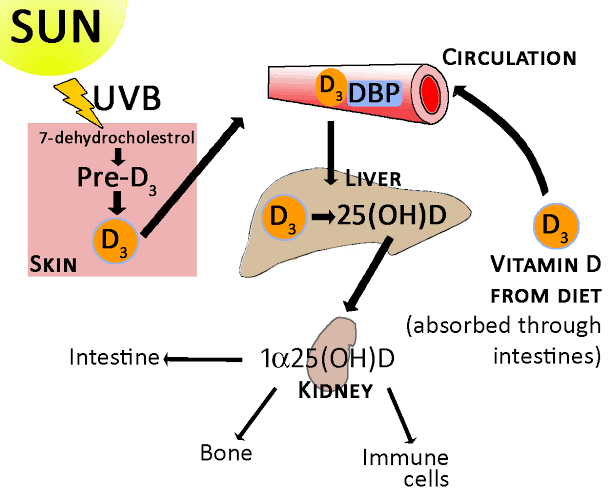
CALCITONIN AND VITAMIN D
Calcitonin
Calcitonin is a hormone that is produced in humans by the parafollicular cells (commonly known as C-cells) of the thyroid gland. Calcitonin is involved in helping to regulate levels of calcium and phosphate in the blood, opposing the action of parathyroid hormone. This means that it acts to reduce calcium levels in the blood. However, the importance of this role in humans is unclear, as patients who have very low or very high levels of calcitonin show no adverse effects.
Calcitonin reduces calcium levels in the blood by two main mechanisms:
- It inhibits the activity of osteoclasts, which are the cells responsible for breaking down bone. When bone is broken down, the calcium contained in the bone is released into the bloodstream. Therefore, the inhibition of the osteoclasts by calcitonin directly reduces the amount of calcium released into the blood. However, this inhibition has been shown to be short-lived.
- It can also decrease the resorption of calcium in the kidneys, again leading to lower blood calcium levels.
Manufactured forms of calcitonin have, in the past, been given to treat Paget’s disease of bone and sometimes hypercalcaemia and bone pain.
Vitamin D
The physiological role of vitamin D depends on calcium supply and calcium balance. When the calcium balance is normal, the major target of vitamin D is intestine. Vitamin D stimulates mainly active intestinal calcium transport mechanism. During a negative calcium balance, bone effects of vitamin D become dominant.
Rickets is a condition that affects bone development in children. It causes bone pain, poor growth and soft, weak bones that can lead to bone deformities. Adults can experience a similar condition, which is known as osteomalacia or soft bones. Read more about the signs and symptoms of rickets and osteomalacia.
At the end of the lesson, students should know about
- Functions of calcitonin
- actions of vitamin D
- osteomalacia and rickets


